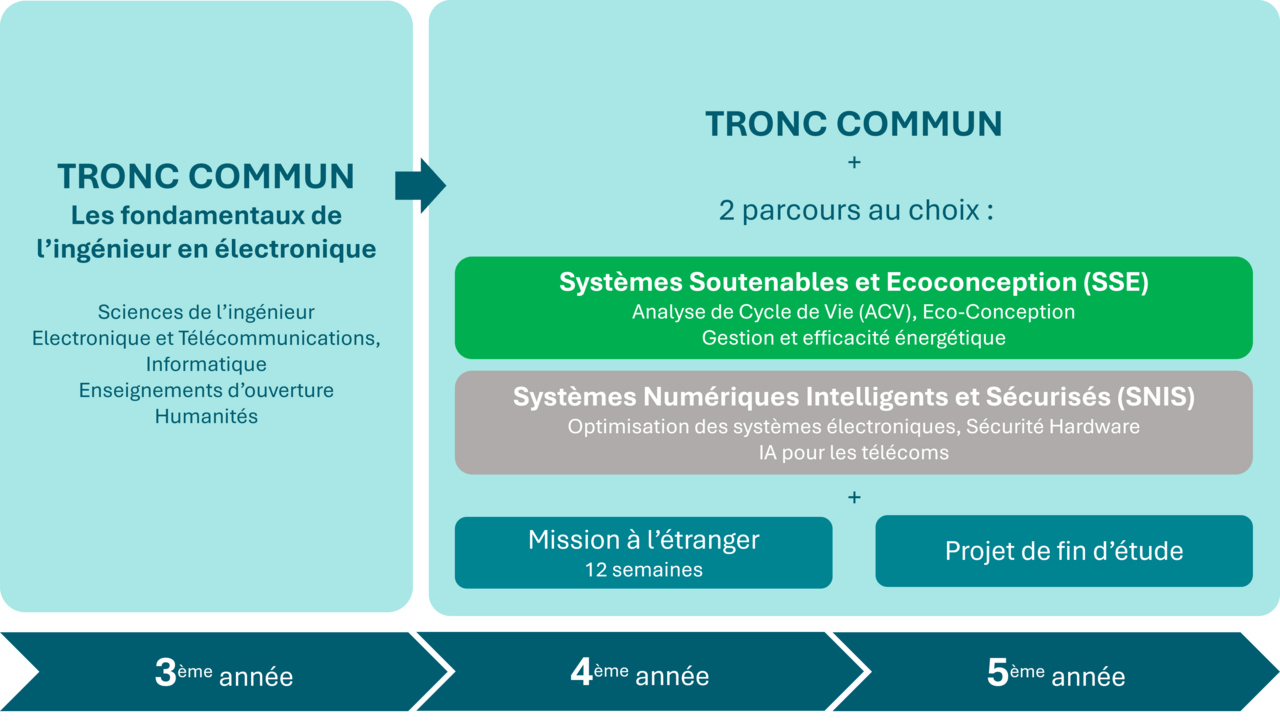The E-SET apprenticeship program is designed to train electronics engineers capable of handling problems related to the design, development and industrialization of complex electronic systems. The program prepares future electronics engineers to meet the challenges of innovation, sustainability and security that face companies today.
With a solid scientific background in electronics and embedded systems, as well as transversal skills consolidated by their professional experience, E-SET engineers are ideally suited to work in innovative companies in all fields related to electronics.
🔎 See job opportunities for an electronics engineer in Brittany (France)
NEW 2025: 2 program available
From year 4 onwards, the course chosen will provide additional expertise in sustainable electronics or intelligent and secure digital systems.
Each of these courses is designed to meet the changing needs of electronics engineers.

SSE: A path to the future for responsible engineers
In a world facing major environmental challenges, the electronics sector must move towards more sustainable solutions. The Sustainable Systems and Eco-design (SSE) program trains engineers to design electronic systems that respect the environment, while meeting the economic and societal expectations of companies and consumers.
Why choose the SSE pathway?
Addressing environmental issues
The electronics industry is one of the most impactful in terms of energy consumption, use of scarce resources and production of electronic waste. By specializing in this course, you will be at the forefront of :
- Reduce the environmental impact of electronic products at every stage of their life cycle.
- Optimize the use of resources for more sustainable electronics.
- Contribute to the circular economy by promoting the repair, recycling and reuse of components.
Key skills for a transforming market
The SSE pathway will provide you with unique expertise in three main areas:
Identify and quantify the environmental impact of an electronic product from design to end-of-life.
What you'll learn:
- Identify critical stages in the life cycle (raw material extraction, manufacturing, use, recycling).
- Carry out carbon, energy and environmental assessments.
- Propose optimization solutions to reduce the ecological footprint.
Key competency: Becoming a key player in design for sustainability, in demand by engaged companies.
Combining technical performance and environmental responsibility.
What you'll learn:
- Design electronic products with sustainable and recyclable materials.
- Integrate environmental criteria right from the design phase, without compromising performance.
- Innovate in the design of circuits, electronic boards and integrated systems to minimize their ecological impact.
Key competence: Make eco-design a competitive advantage in the development of electronic products.
Reduce the energy consumption of electronic systems for optimal, sustainable performance.
What you'll learn:
- Optimize the energy efficiency of electronic circuits and components.
- Develop intelligent energy management solutions.
- Design energy-efficient systems, essential for connected objects, portable devices and digital infrastructures.
Key competency: Become an expert in energy efficiency, a major asset for the electronics, telecommunications and energy sectors.
👉 Want to find out more?
Contact us at esos@insa-rennes.fr

